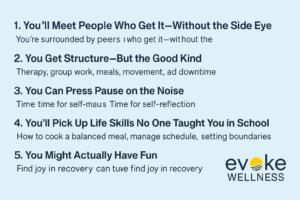If you’re in your 20s and sober—or even just thinking about sobriety—you might already feel like you’re speaking a different language than everyone around you. Your friends are swapping bar stories, making “remember when” jokes, and planning weekends around happy hour. You’re Googling “how to make friends when you don’t drink” at 1 a.m.
And the idea of going to a residential treatment program might sound… intense. Like something for “other” people. Like the ultimate proof that you’re the weird one.
But here’s the thing: residential treatment can actually be one of the most unexpectedly freeing moves you make in your 20s. You’re not checking out of life—you’re stepping into it in a whole new way.
Here are five perks you might not expect—and why they matter more than you think.
1. You’ll Meet People Who Get It—Without the Side Eye
In your everyday world, being sober in your 20s can feel like walking into a party where you don’t know the rules anymore. People notice you’re not drinking. They ask why. They tell you you’re “too young to quit.”
In residential treatment, you won’t have to explain yourself every five minutes. You’ll be surrounded by people—many close to your age—who know exactly what it’s like to feel out of sync with the crowd.
One 24-year-old client told us:
“It was the first time I didn’t feel like the odd one out. I could say how I was feeling without getting ‘that look.’ We got each other, no explanations needed.”
That sense of belonging can be life-changing, especially if you’ve been carrying your sobriety like a secret.
2. You Get Structure—But the Good Kind
When you’re newly sober, free time can feel dangerous. Too much space in your day and your brain starts wandering to old habits or old friends who might not support your goals.
Residential programs give you a daily rhythm—therapy, group work, meals, movement, downtime—that keeps you engaged without feeling trapped. It’s not about controlling you. It’s about giving you a framework while you figure out what works for you.
Think of it like training wheels for your sober life. You’ll still steer—you just won’t have to balance everything alone at first.
3. You Can Press Pause on the Noise
Let’s be honest—being in your 20s right now is loud. Social media is loud. Group chats are loud. Your own mind might be loud.
In treatment, you get to hit pause. You’re not scrolling through posts of friends at bars. You’re not fielding invites you feel guilty turning down. You’re not juggling FOMO with the fear of what might happen if you say yes.
Instead, you have time—real, uninterrupted time—to hear yourself think. And sometimes, that’s where the biggest breakthroughs start.
4. You’ll Pick Up Life Skills No One Taught You in School
You probably didn’t have a high school class on how to manage your mental health, budget your money, or make a meal that isn’t ramen.
A good residential treatment program goes beyond “don’t drink, don’t use” and actually teaches you how to live well. That might mean learning:
- How to cook a balanced meal.
- How to manage a schedule without burning out.
- How to communicate your needs without apologizing for them.
One client joked:
“I came to learn how to stay sober. I left knowing how to make a grocery list.”
It’s the small, practical wins that make the transition back to everyday life a lot smoother.
5. You Might Actually Have Fun
Yes, fun. Recovery doesn’t have to be all heavy talks and hard work. Many programs include recreational activities—yoga, art, music, games, hiking—that let you reconnect with joy without substances.
For some, this is the first time in years they’ve laughed until their stomach hurt without a drink in their hand.
Fun in recovery isn’t just possible—it’s necessary. Because you’re not just giving up something, you’re building something better.
Why These Perks Matter for Your 20s
Your 20s are supposed to be “the best years of your life,” right? But if alcohol or substances have been running the show, those years can feel more exhausting than exciting.
Residential treatment isn’t a sign that you’ve messed up beyond repair. It’s a sign you’re willing to take your life seriously enough to make changes early—before more damage piles up.
And the earlier you start, the more time you have to live a life you actually want.
FAQs About Residential Treatment for 20-Somethings
1. Will I be the youngest person there?
Not necessarily. Many programs, including ours, often have clients in their early and mid-20s. Even if there are older clients, you’ll likely find common ground fast—addiction doesn’t care how old you are.
2. What if I feel awkward at first?
That’s normal. Most people feel some awkwardness in the first few days. Staff and peers know how to help you settle in, and soon the structure will start to feel familiar.
3. Can I still keep in touch with friends?
Yes, but contact may be limited at first to help you focus on your recovery. You’ll have ways to connect during approved times, and you can add more as you progress.
4. Will it feel like school or jail?
Neither. There’s structure, but it’s built for support, not punishment. You’ll have responsibilities, but also freedom within the program’s boundaries.
5. Can I work or go to school while in treatment?
Most residential programs recommend taking a break so you can focus fully on recovery. Some offer educational or vocational planning as part of aftercare.
6. How long will I be there?
It depends on your needs—some stay 30 days, others longer. Your treatment plan will be tailored to your situation.
7. What happens after I leave?
You’ll have an aftercare plan that might include outpatient therapy, support groups, sober housing, or continued skill-building so you’re not starting from scratch.
The Bottom Line
If you’re a 20-something who feels “different” because you’re sober, residential treatment might be the place where you stop feeling like the weird one—and start feeling like yourself again.
It’s not about losing your youth. It’s about claiming it back, with clear eyes and a stronger sense of who you want to be.
Call 866-931-6429 or visit our Residential treatment program services in Cohasset, MA to see how we can help you start building a sober life you actually want to live.





